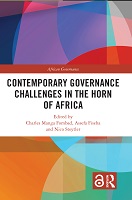Chapter 3 Federal systems of governance in Africa
Proposal review
Patterns and pitfalls
| dc.contributor.author | Steytler, Nico | |
| dc.date.accessioned | 2022-11-11T13:01:58Z | |
| dc.date.available | 2022-11-11T13:01:58Z | |
| dc.date.issued | 2023 | |
| dc.identifier.uri | https://library.oapen.org/handle/20.500.12657/59230 | |
| dc.description.abstract | Federalism as a mode of governance has been a popular response to most conflicts which stemmed from ethnic/language/religious mobilisation. However, the track record of resolving communal or identity conflicts has not always been good, the least of all in Somalia, Sudan and South Sudan. Why the lack of success? Is the federal solution inherently inappropriate for communal accommodation by exacerbating the problem? If not inevitably or inherently inappropriate, is it then a question of poor design? Or is it merely ineffectual implementation of the ‘federal solution’? The chapter argues that federal arrangements in Africa have been the last measure to hold countries together; therefore federalism per se cannot blamed for persistent conflicts. Whether federalism is able to address communal conflicts depends much on constitutional designs dealing with both ethnic issues and federal concepts in general. Where federal solutions have been tried, it is highly centralised, and even then often superficially and reluctantly implemented. To judge the efficacy of federal arrangements in constitutions they first must be implemented. This depends again on a broader embrace of constitutionalism; democracy, separation of powers, limited government, and the rule of law have to become part of political/legal culture of a country. | en_US |
| dc.language | English | en_US |
| dc.subject.classification | thema EDItEUR::L Law::LN Laws of specific jurisdictions and specific areas of law::LND Constitutional and administrative law: general::LNDH Government powers | en_US |
| dc.subject.classification | thema EDItEUR::G Reference, Information and Interdisciplinary subjects::GT Interdisciplinary studies::GTU Peace studies and conflict resolution | en_US |
| dc.subject.classification | thema EDItEUR::J Society and Social Sciences::JP Politics and government | en_US |
| dc.subject.other | Federal Systems, Governance, Africa | en_US |
| dc.title | Chapter 3 Federal systems of governance in Africa | en_US |
| dc.title.alternative | Patterns and pitfalls | en_US |
| dc.type | chapter | |
| oapen.identifier.doi | 10.4324/9781003265306-3 | en_US |
| oapen.relation.isPublishedBy | 7b3c7b10-5b1e-40b3-860e-c6dd5197f0bb | en_US |
| oapen.relation.isPartOfBook | 5afaf867-f156-4098-bc3b-7332c21d9465 | en_US |
| oapen.relation.isFundedBy | da07314d-684b-4655-9398-6f7271557ad9 | en_US |
| oapen.relation.isbn | 9781032207926 | en_US |
| oapen.relation.isbn | 9781032207995 | en_US |
| oapen.imprint | Routledge | en_US |
| oapen.pages | 27 | en_US |
| peerreview.anonymity | Single-anonymised | |
| peerreview.id | bc80075c-96cc-4740-a9f3-a234bc2598f1 | |
| peerreview.open.review | No | |
| peerreview.publish.responsibility | Publisher | |
| peerreview.review.stage | Pre-publication | |
| peerreview.review.type | Proposal | |
| peerreview.reviewer.type | Internal editor | |
| peerreview.reviewer.type | External peer reviewer | |
| peerreview.title | Proposal review | |
| oapen.review.comments | Taylor & Francis open access titles are reviewed as a minimum at proposal stage by at least two external peer reviewers and an internal editor (additional reviews may be sought and additional content reviewed as required). |

